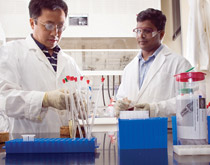“Can we actually do this?” chemist Danith Ly asks aloud, and for good reason. What the Carnegie Mellon researcher and his lab members are attempting has never been done. They want to use synthetic techniques to resurrect and modify a disease-fighting peptide that hasn’t existed in humans for 9 million years.

Peptides are short chains of amino acids joined together by peptide bonds. Ly became specifically intrigued by a peptide dubbed RTD-1, which had been discovered in some primates and was a part of humans’ DNA until 9 million years ago.
“It has the therapeutic potential to help create a new class of pharmaceuticals aimed at combating hard-to-treat diseases such as HIV,” he says.
Unfortunately, it’s flimsy and degrades easily, which minimizes its practicality.
But Ly and his team believed they could strengthen RTD-1, making it far more cost-effective and efficient to produce. After three years of testing, they found out that, yes, they could actually do it.
Their results were recently reported in the Journal of the American Chemical Society. More research needs to take place, but Ly believes this tweak of a peptide from our past could have significant ramifications on the way disease is treated in the future.
—Janet Jay (DC’07)
Related Links:
The Ly Group



